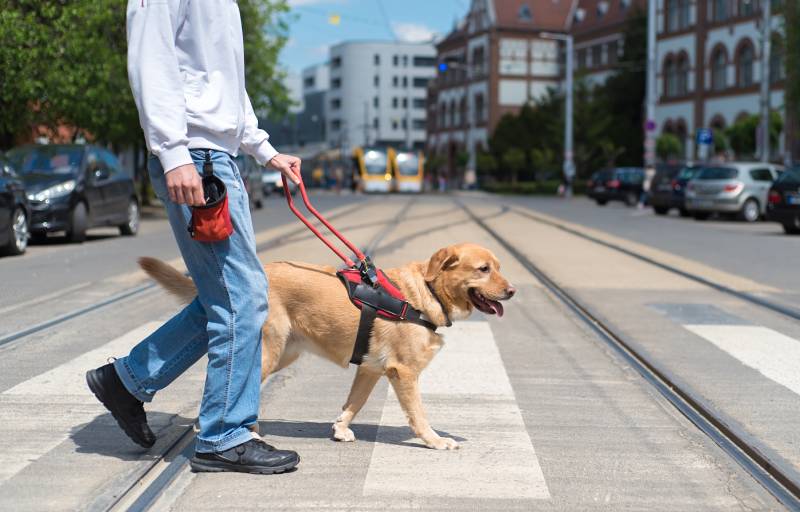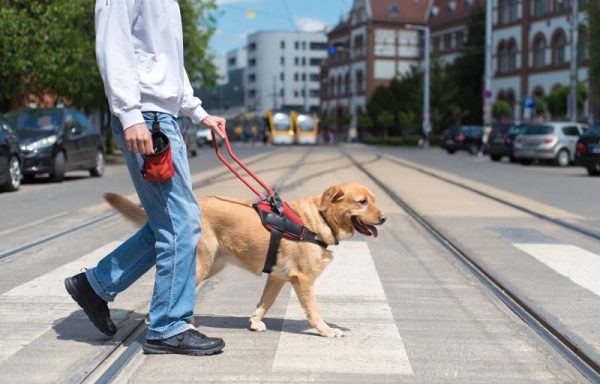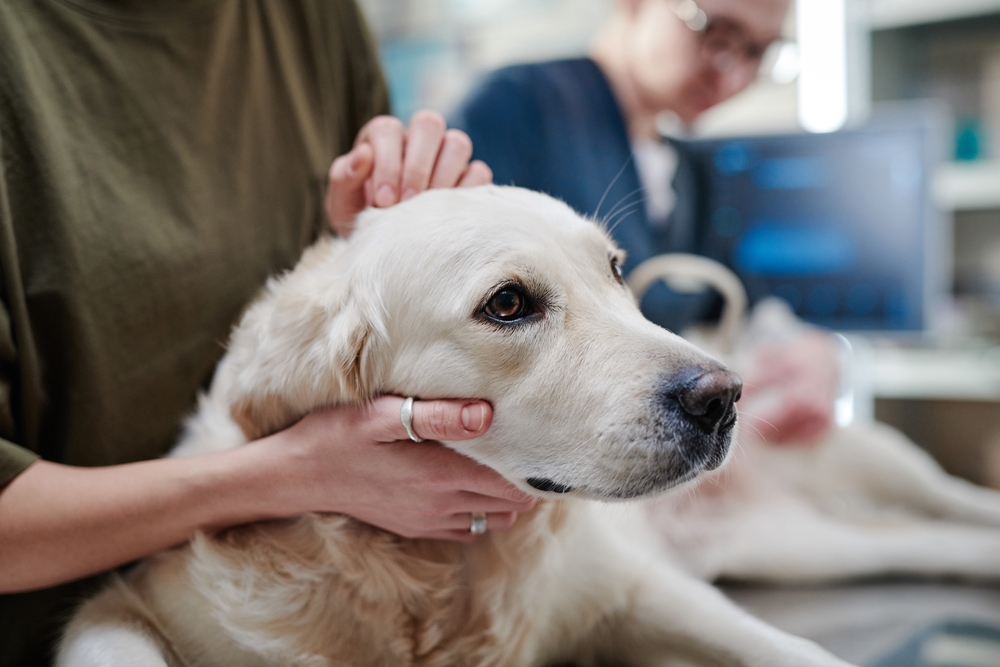Click to Skip Ahead
Service animals provide disabled people with valuable assistance, and the most well-known of their kind are the famous guide dogs. Trained to lead and assist the legally blind with everyday tasks, you might imagine that these specially trained dogs are very expensive to buy and own. How much is a guide dog, and how much do they cost to take care of on a day-to-day basis? You can expect to pay $40,000 to $60,000 for a guide dog and approximately $180–$220 per month to take care of a guide dog.
Let’s check out the answers to both of those and more down below.
Bringing Home a New Guide Dog: One-Time Costs
Guide dogs cost money to care for like any pet, but upfront, they’re not very cost-prohibitive for the disabled folks that really need them. You may even be eligible for additional services like veterinary financial assistance when you’re paired with a guide dog that can help ease the monetary burden of pet parenthood.
Free
Organizations like Guide Dogs for the Blind and the Guide Dog Foundation receive a lot of very generous donations from the public that allow them to train guide dogs, pair them with the right partners, and provide support for disabled guide dog owners. In most cases of legal blindness, organizations like those can help partner you with the perfect guide dog who’s been meticulously trained to assist with various areas of everyday life.
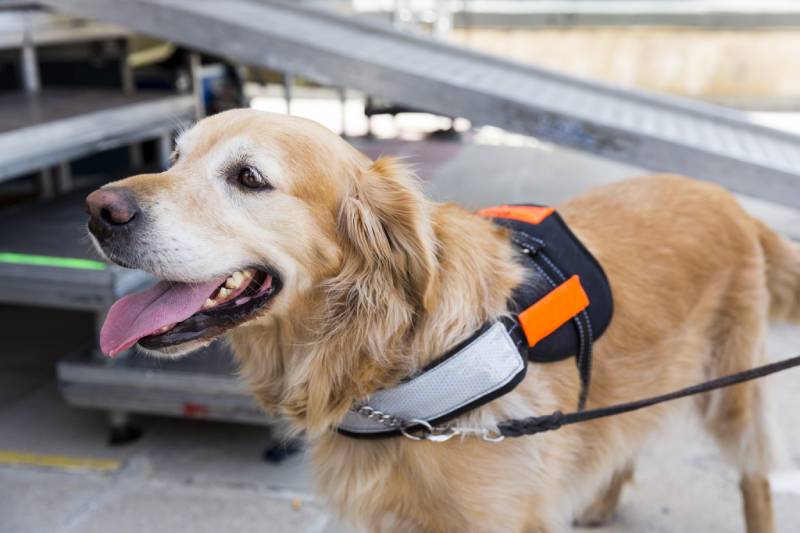
Adoption
Sometimes a guide dog is “retired” after some years of service to their disabled partner, but in the majority of cases, they’re offered to live with people involved in their training from the charity that sponsored them. If that’s not possible, charities like Guide Dogs for the Blind have rehoming processes that vary by organization.
Initial Setup and Supplies
- $100–$160
Guide dogs come with all their shots, training, and many of the essentials that you’d normally have to pay for with other dogs. However, the charities that raise and train guide dogs take care of much of that for you. They’re even neutered or spayed before they match up with their partner! Financial ability shouldn’t affect whether you can afford a guide dog, but there are some things you’ll need to set things up.
List of Guide Dog Care Supplies and Costs
| ID Tag and Collar | $15 |
| Dog Bed | $30 |
| Nail Clipper (optional) | $7 |
| Brush (optional) | $10 |
| Toys | $20–$50 |
| Carrier | $40–$100 |
| Food and Water Bowls | $10 |
How Much Does a Guide Dog Cost Per Month?
- $180–$220 per month
Most agree that cost shouldn’t be an obstacle for the disabled to have access to a guide dog. Thankfully, the organization that trained your guide dog will have taken care of the costliest early parts of their life—training, housing, food, vaccinations, spay/neuter, that kind of stuff. That said, you’ll still be responsible for the day-to-day essentials like food, brushes, and toys. Lastly, in some cases, you might be on the hook for your dog’s vet bills, too.
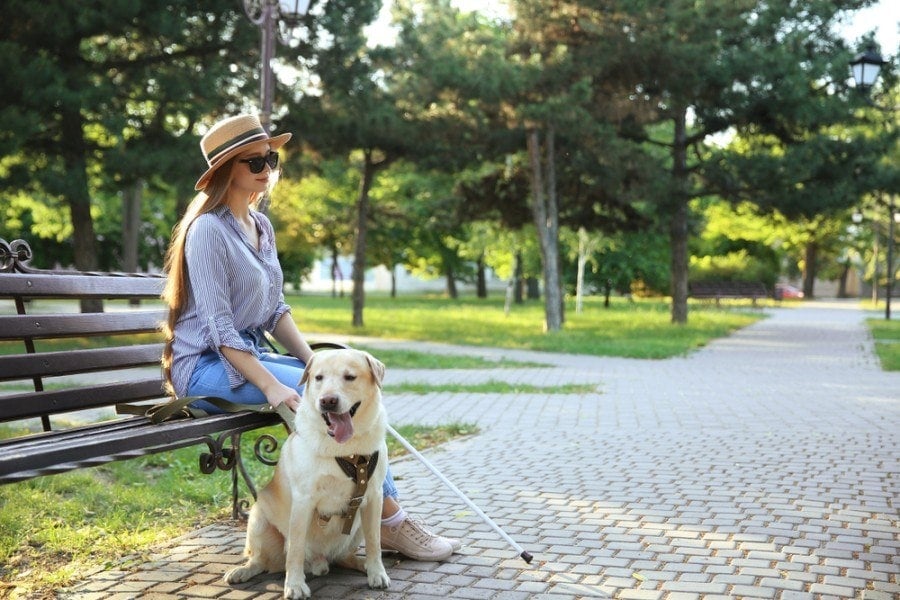
Health Care
- $0–$200
Yes, you read that right. Healthcare for guide dogs is typically free, but not always. Some charities are well-off enough to offer financial assistance for your guide dog’s veterinary care, but not all are able to provide that level of assistance. It’s important to clarify this before taking your dog home so you can know whether you need to budget for medical expenses.
In some cases, you might be on the hook for your dog’s vet bills after they come to live with you, which should be fairly minimal considering guide dogs come with all their shots and are spayed or neutered. At the most, you may be liable for emergencies that crop up. Pet insurance is invaluable there, but we’ll talk about that a bit later.
Food
- $40–$60 per month
Guide dogs need a high-quality diet of dog food with no less than 20% protein content and balanced ingredients that provide enough fat, carbs, and other essential nutrients they need to stay healthy. Feeding a guide dog poor quality food can affect their health and potentially affect their ability to do their job, so keeping them well-fed is critical. It’s important to be aware of any health issues that require a special diet, but you can work that out in more detail with your vet.
PangoVet. It’s an online service where you can <b>talk to a vet online</b> and get the personalized advice you need for your pet — all at an affordable price!
</p>
<div class="su-button-center"><a href=https://www.dogster.com/lifestyle/"https://pangovet.com?utm_source=dogster&utm_medium=article&utm_campaign=dog-nutrition%22 class="su-button su-button-style-default" style="color:#FFFFFF;background-color:#FF6600;border-color:#cc5200;border-radius:9px;-moz-border-radius:9px;-webkit-border-radius:9px" target="_blank" rel="nofollow"><span style="color:#FFFFFF;padding:0px 24px;font-size:18px;line-height:36px;border-color:#ff944d;border-radius:9px;-moz-border-radius:9px;-webkit-border-radius:9px;text-shadow:none;-moz-text-shadow:none;-webkit-text-shadow:none"> Click to Speak With a Vet</span></a></div></div></div>"}" data-sheets-userformat="{"2":513,"3":{"1":0},"12":0}" data-sheets-validation-definition="{"1":{"1":{"1":23,"2":[{"1":1,"3":{"1":{"1":[{"1":4,"6":1},{"1":1,"2":"="}]},"2":{"1":[{"1":2,"2":"="},{"1":3,"3":1}]},"3":"R1]S"},"4":[{"1":{"1":1,"2":21,"3":0,"4":1,"5":2236944,"6":"841046713"},"2":1}]}],"6":[{"1":{"2":{"1":2,"2":"🍎 Ate or drank"}},"2":{"1":2,"2":676776},"3":{"1":2,"2":12574966}},{"1":{"2":{"1":2,"2":"❤️ Preventative wellness"}},"2":{"1":2,"2":676776},"3":{"1":2,"2":12574966}},{"1":{"2":{"1":2,"2":"🩺 Other"}},"2":{"1":2,"2":676776},"3":{"1":2,"2":12574966}},{"1":{"2":{"1":2,"2":"⚠️ Urinary problems"}},"2":{"1":2,"2":676776},"3":{"1":2,"2":12574966}},{"1":{"2":{"1":2,"2":"👁️ Eye issues"}},"2":{"1":2,"2":676776},"3":{"1":2,"2":12574966}},{"1":{"2":{"1":2,"2":"🛡️ Flea & tick"}},"2":{"1":2,"2":676776},"3":{"1":2,"2":12574966}},{"1":{"2":{"1":2,"2":"🤮 Vomiting"}},"2":{"1":2,"2":676776},"3":{"1":2,"2":12574966}},{"1":{"2":{"1":2,"2":"🐕 Behavior & training"}},"2":{"1":2,"2":676776},"3":{"1":2,"2":12574966}}]},"2":{"1":{"1":[{"1":4,"6":0},{"1":4,"6":1},{"1":2,"3":"CONDITION_ONE_OF_RANGE","4":2},{"1":1,"2":"="}]},"3":"R0]R1]FCONDITION_ONE_OF_RANGE:2]S"},"3":[{"1":{"1":0,"2":1,"3":0,"4":1,"5":1118464},"2":0},{"1":{"1":1,"2":21,"3":0,"4":1,"5":2236944,"6":"841046713"},"2":1}]},"2":"","3":1,"4":1,"6":0}" data-sheets-validation-id="0"> If you need to speak with a vet but can’t get to one, head over to PangoVet. It’s an online service where you can talk to a vet online and get the personalized advice you need for your pet — all at an affordable price!

Grooming
- $0–$40 per month
Most guide dogs aren’t excessively hard to care for, but many breeds used do shed, like the Labrador Retriever or Golden Retriever. Poodles, which are often used too, shed less on average but may need a periodic trip to the dog groomer to keep their coats in good shape. Grooming should be a low-maintenance affair with the exception of a good vacuuming once in a while.
Pet Insurance
- $20 per month
Pet insurance is a good idea for guide dogs, especially if you’re responsible for their medical expenses. It helps protect against unexpected medical emergencies that can incur huge vet bills for a reasonable monthly premium. If you have significant savings to pay for an emergency vet trip, though, you may opt to skip this for the sake of pinching a few pennies.
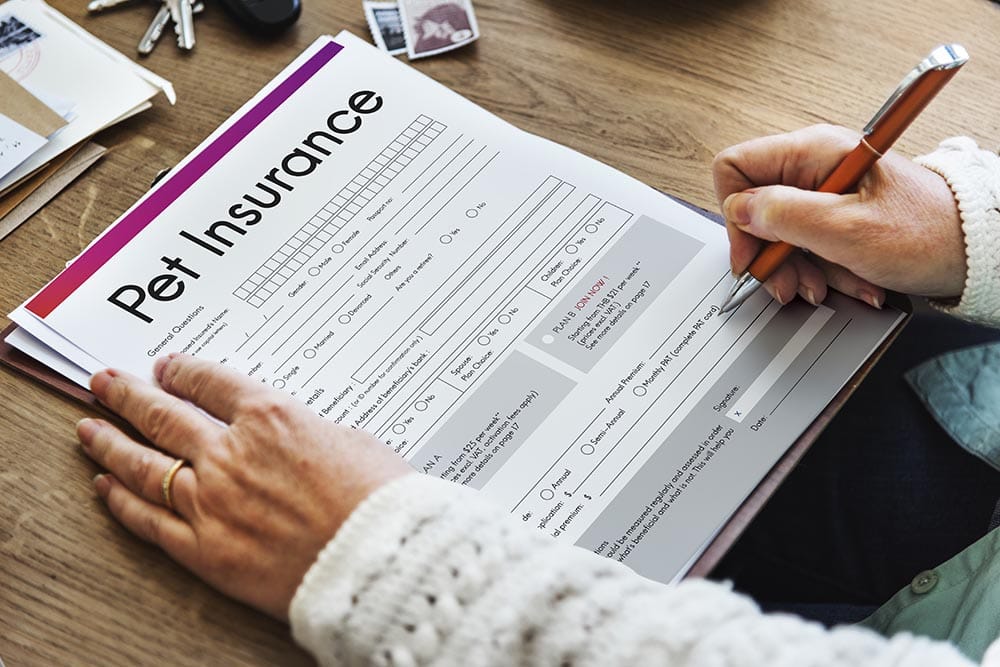
Environment Maintenance
- 80–$120 one-time, $20–$40 per month
Guide dogs typically come housetrained and don’t require any costly items, like potty pads. A nice dog bed and a comfortable, appropriately sized dog crate are really all you need to keep your guide dog comfortable. Other necessary items are a harness, leash, collar, cleaning supplies, and dog pads for accidents.
Entertainment
- $20–$40 per month
This category can vary as much as you’re willing to lavish your guide dog with toys and treats. Buying bulk packages of toys and treats can help save you money in the long run, as can subscribing to a pet toy box that sends toys to your home at a low monthly cost.
Total Monthly Cost of Owning a Guide Dog
- $180–$220 per month
The monthly costs aren’t that expensive, and hopefully don’t discourage any visually impaired folks out there from looking into getting a guide dog of their own. They do add up over time, certainly, but they’re not super cost-prohibitive when it comes to boosting independence and safety.
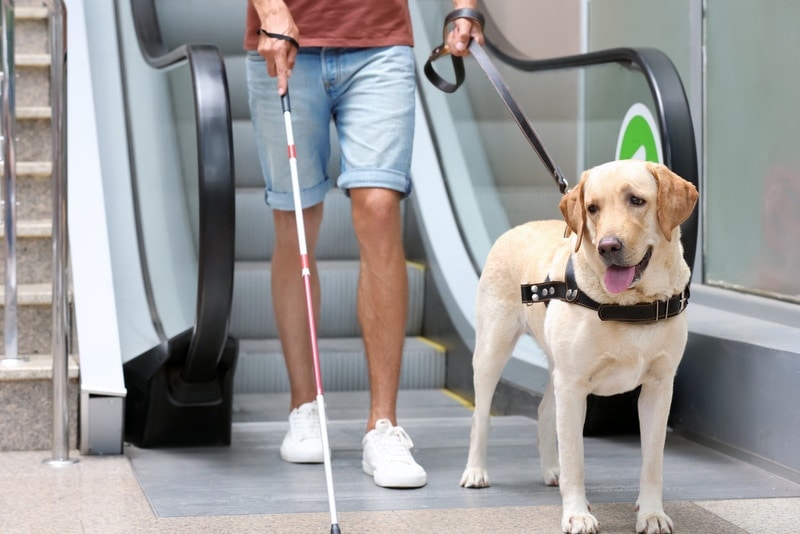
Additional Costs to Factor In
Guide dogs are typically allowed anywhere you go at no additional charge, legally considered essential medical equipment under the Americans with Disabilities Act (ADA). That means you don’t have to pay extra pet charges when traveling at hotels or airlines, but that doesn’t mean you won’t have some unexpected costs sometimes.
For instance, guide dogs that get very bored may become destructive and chew up your property. That can cost you shoes, furniture, or other damages around your home that you’ll have to pay for. In severe cases of a guide dog being destructive, costly behavioral therapy might be necessary too. Any damages caused in public will be on you, too.
 Owning a Guide Dog on a Budget
Owning a Guide Dog on a Budget
Owning a guide dog is fairly inexpensive, especially considering all the money organizations pay to raise and train them. Your most recurring cost will be food, which you can save on by buying kibble in bulk. We don’t recommend skimping on quality to save a few bucks. Guide dogs are typically more active in general, so they need high-quality food to stay in shape and help stave off health conditions.
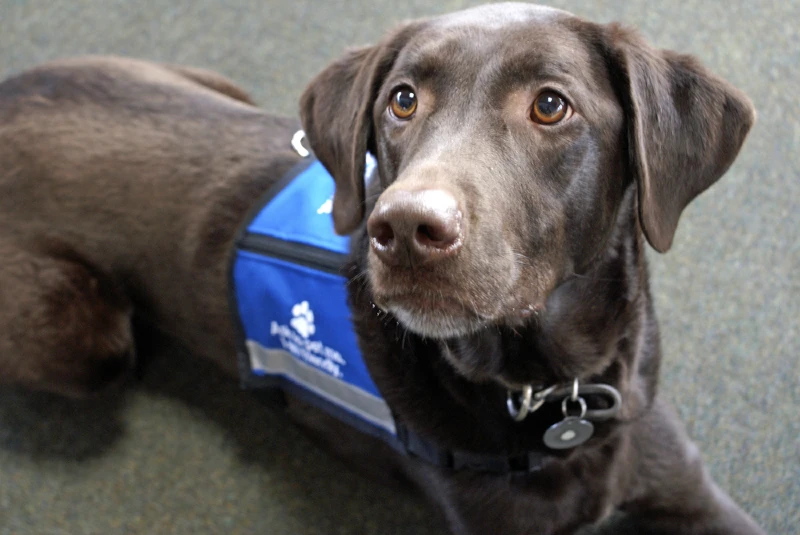
Saving Money on Guide Dog Care
Other than buying kibble in bulk, we recommend reaching out to the organization that pairs you with your guide dog if you need help with their care. While bigger charities can afford to help with things like vet bills, they can usually refer you to other services that they don’t provide themselves. Examples include legal assistance, rehabilitation, behavioral therapy, and more.
Final Thoughts
Guide dogs are free thanks to charitable donations to organizations that specialize in training and matching them with the right disabled owners to make life easier and more accessible. At most, you’ll be responsible for the cost of feeding, housing, and keeping them presentable, which averages out to a couple of hundred dollars a month at most. There are also ways you can keep this cost down, like buying food in bulk and taking advantage of any extra services you may be eligible for.
Featured Image Credit: SasaStock, Shutterstock

